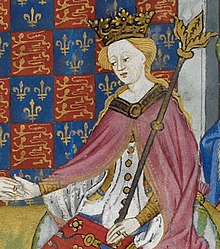http://mylifeishistory.wordpress.com/2012/07/05/the-white-rose-bled-red-was-henry-vi-to-blame-for-the-fifteenth-century-english-civil-wars/
(Author’s note: This post is based on research conducted at my time at Lancaster University in the U.K. Note that no primary sources were consulted given the nature of the assignment.)The fifteenth century saw a period of civil wars in Britain, later termed the Wars of the Roses. Most history books tell us that these series of battles occurred between the cadet branches of the English royal family, both Plantagenets but one descended from the duchy of Lancaster and one from the duchy of York. Victories volleyed back and forth between both families but ultimately led to the rise of the House of Lancaster after the battle of Bosworth Field in 1485. In this, Richard III lost his life and Henry Tudor (later Henry VII), the last son of Lancaster with an at best tenuous claim to the the throne, won the day. Many people, including B.P. Wolffe, argue that the wars’ causes primarily stem from the “personal failings of Henry VI”. I would argue, however, that although Henry’s deficient personality definitely aided the civil wars’ progression, by no means did it contribute solely to them. Instead, his personal failings, so to speak, did little to relieve other internal and external pressures such as a severe financial crisis, the loss of English-held lands in France, and domestic rivalries and feuding.
At the time of his birth in 1422, Henry VI appeared to have had an auspicious beginning. He was the son of Henry V, arguably the greatest British monarch in history, and Catherine of Valois, the French king’s daughter. Henry V had succeeded in conquering most of France and quite possibly would have been crowned king of France had he not died of dysentery in 1422, leaving his son the infant monarch of both England and France. A dual monarchy was eventually set up to govern both of the young king’s dominions. Both his uncles, John, duke of Bedford, and Humphrey, duke of Gloucester, received protectorates, in France and England respectively. Bedford held the predominant protectorate in both England and France; Gloucester had to renounce authority in favour of Bedford upon his return from France. Bedford achieved some military success in France, continuing Henry V’s policies. In England, however, factions began to form between Gloucester and his rival for power and court influence, Henry Beaufort, bishop of Winchester and eventually Cardinal. Tensions over authoritative and ecclesiastical rights almost erupted into civil war twice, and Bedford was called back from France to mediate between the rival parties. Things on the international scene played out in even more violent ways. France was embroiled in a civil war between the Armagnacs and the Burgundians that began in 1407. England traditionally allied with Burgundy, but with French grants of land to the English and the enticing promise of Henry’s claim to the throne, England enjoyed playing one against the other. Although the seeds of future discord were sown during Henry VI’s minority, his future seemed ready for the taking at his coronation in 1429.
Handsome chap, ain’t he?
Henry VI’s malleable mind and great stubbornness combined to form his greatest fault. Henry paid too much heed to his favourites and also often acted independently of his own council. Furthermore, his generosity favored his relatives including William de la Pole, earl and soon duke of Suffolk and the Staffords. This favoritism split the royal court into two factions, the royalists who supported the monarch and Suffolk and those who threw their lot in with the closest relative, Richard of York. Those nearest Henry had the opportunity to influence him to their own ends, and this often proved detrimental.

Richard, duke of York. Another handsome chap, eh? Image courtesy of Luminarium.org.

Portraiture
really wasn’t that flattering back then, was it? Margaret of Anjou
looks anything but sexy. Image courtesy of Wikimedia commons.
The cost of ‘peace’, as it were, was astronomical. Firstly, he did not have the base of income his own father had. Henry granted away large tracts of lands as well as wardships early in his reign and did not expect payment in return; indeed, Suffolk had obtained the wardship of the wealthy heiress, Margaret Beaufort, kin of the king who would be the mother of Henry VII. Second, the constant losses in France caused Parliament to be less lenient in granting subsidies with no promise of return. Finally, Henry V’s excursions in France had caused a backlog of debt that the Exchequer could barely handle. Attempts to obtain foreign loans often failed as well since the English had bad credit abroad. They could hardly afford to make more payments. This heavily influenced the entire loss of France because not enough funding could be secured to supply desperately needed troops and supplies to the remaining areas in France that the English controlled, Normandy and Gascony. In the end, the loss of Normandy and Gascony with only Calais remaining in English hands precluded the fighting that led to the War of the Roses.

English holdings in France under Angevin and later Plantagenet rule. Image courtesy of the History of England podcast.
People often split the noble groups that fought in the War of the Roses into either Lancastrians or Yorkists. These two groups originated in the ‘peace-favouring’ and ‘war-favouring’ groups of the war with France. During Henry’s minority, Gloucester favoured war while Cardinal Beaufort and Suffolk desired peace. Gloucester grew increasingly outnumbered, but Richard, duke of York, was known to have been on good terms with him. Suffolk and Beaufort, on the other hand, kept themselves close to the king. Cardinal Beaufort’s nephew, Edmund Beaufort, earl and later duke of Somerset, came to be York’s chief rival prior to the start of the war. Somerset, favoured by Henry, ousted York from his lieutenancy in France in 1444. York, slighted by this and his lack of payment in arrears owed him for his soldiers’ maintenance, began the process of trying to rid the king of Somerset’s and Suffolk’s influence. His growing sense of discontent at how Henry ran the country and how his favourites influenced him made York decide to press his own claim to the throne. York’s claim to the throne arguably matched if not overruled Henry’s. He was descended from Edward III’s second son whereas Henry was descended from John of Gaunt, Edward III’s third son. York succeeded in the smooth running of the government when he reigned as Protector of the Realm during Henry’s sickness in 1453-1454, and in his mind, he deserved the throne.
Most of the nobles, however, did not feel the same way. They swore fealty and loyalty to Henry as an anointed monarch, needed his simple mind to further their own ends, and were probably afraid of a stronger personality restricting and replacing their power behind the English crown. Although Henry succeeded in alienating many of his followers and did not act as a proper mediator between feuding nobles, his own periods of indisposition could not be controlled. It was during these times that York came to know his ruling capabilities and how the public reacted to them. There is no doubt that York ruled fairly and implemented many positive reforms. He did, however, attempt to usurp the throne of an anointed monarch for his own gain, something many nobles could not stomach. Thus, they probably fought against York nominally for the protection of the monarchy but actually to prevent another from stealing their influence and livelihood. The Lancastrians’ private ambitions could not be controlled by the king, only monitored and restricted.
Without a doubt, Henry VI’s personal faults cost him much, the respect of his subjects, his territorial inheritance in France, his family, England’s credibility abroad, and much more besides. His incompetence in ruling and politics may be blamed partly on his own simplicity but also partly on his upbringing. Henry grew up depending on others to run his country and did not know how to enforce his own will. This cannot explain the loss of France or the crippling domestic situation at home, but it does shed a more sympathetic light on his failures. Much of Henry’s financial, diplomatic, and domestic problems began as a result of his malleable and weak personality, and so Wolffe’s critique that the primary cause of the War of the Roses is quite accurate, but one cannot forget to factor in the personal rivalries and feuds that helped deteriorate local authority as well.
–
Works Cited: (Note, these are not Chicago-style but rather Turabian…)
Griffiths, R.A. ‘Henry VI (1421–1471)’, Oxford Dictionary of National Biography, Oxford
University Press, 2004; online edn, Sept 2010 [http://www.oxforddnb.com/view/article/12953, accessed 14 Dec 2010]
Keen, M.H., England in the Later Middle Ages, (London, 2003)
Pollard, A.J., North-Eastern England During the War of the Roses, (Oxford, 1990)
Thomson, John A.F., The Transformation of Medieval England, 1370-1559 , (New York, 1983)
Tuck, A., Crown and Nobility, 1272-1461: Political conflict in late medieval England,
(London, 1985)
Wolffe, B.P., ‘The Personal Rule of Henry VI’, in Fifteenth-Century England (ed.) S.B. Chrimes,
(Manchester, 1972)
No comments:
Post a Comment